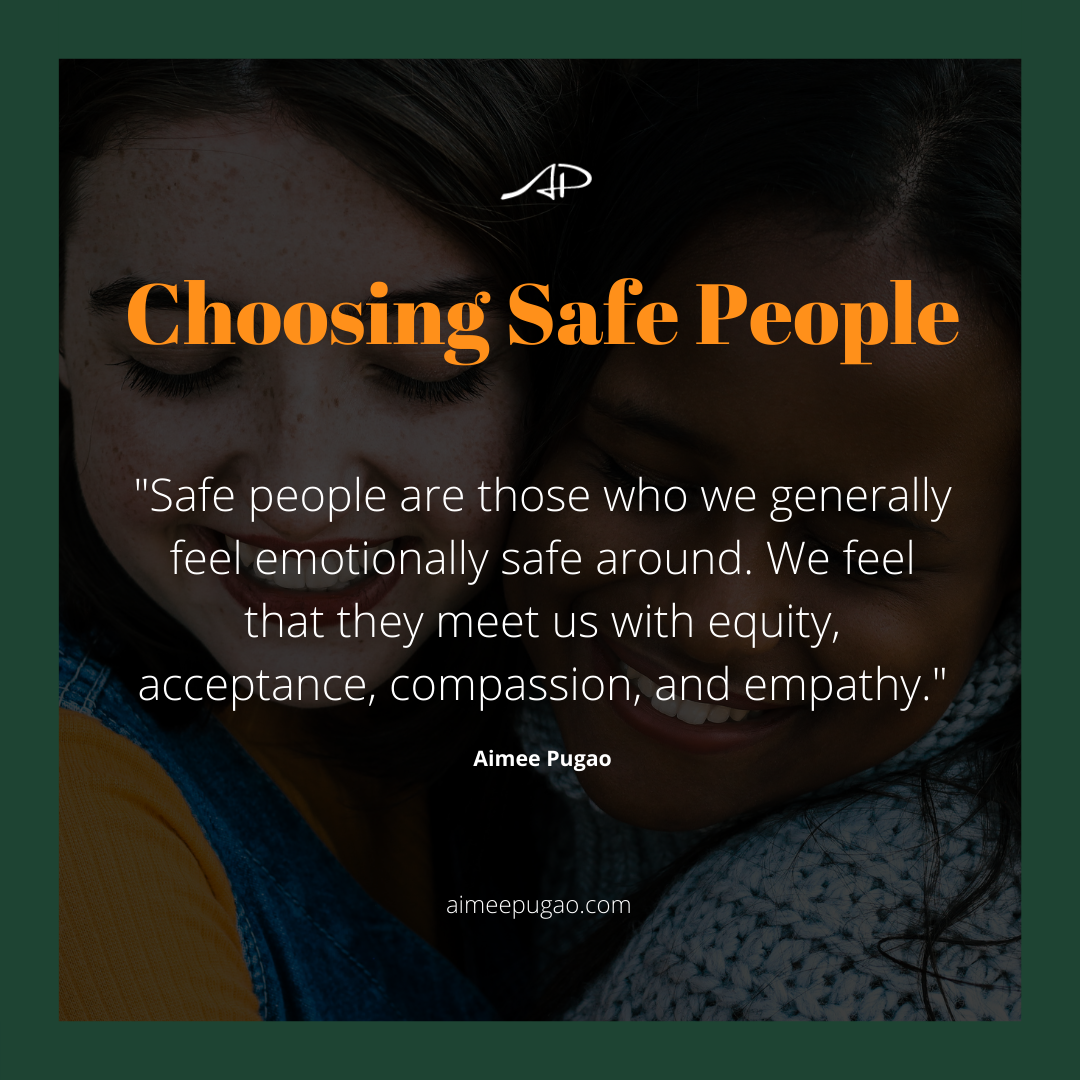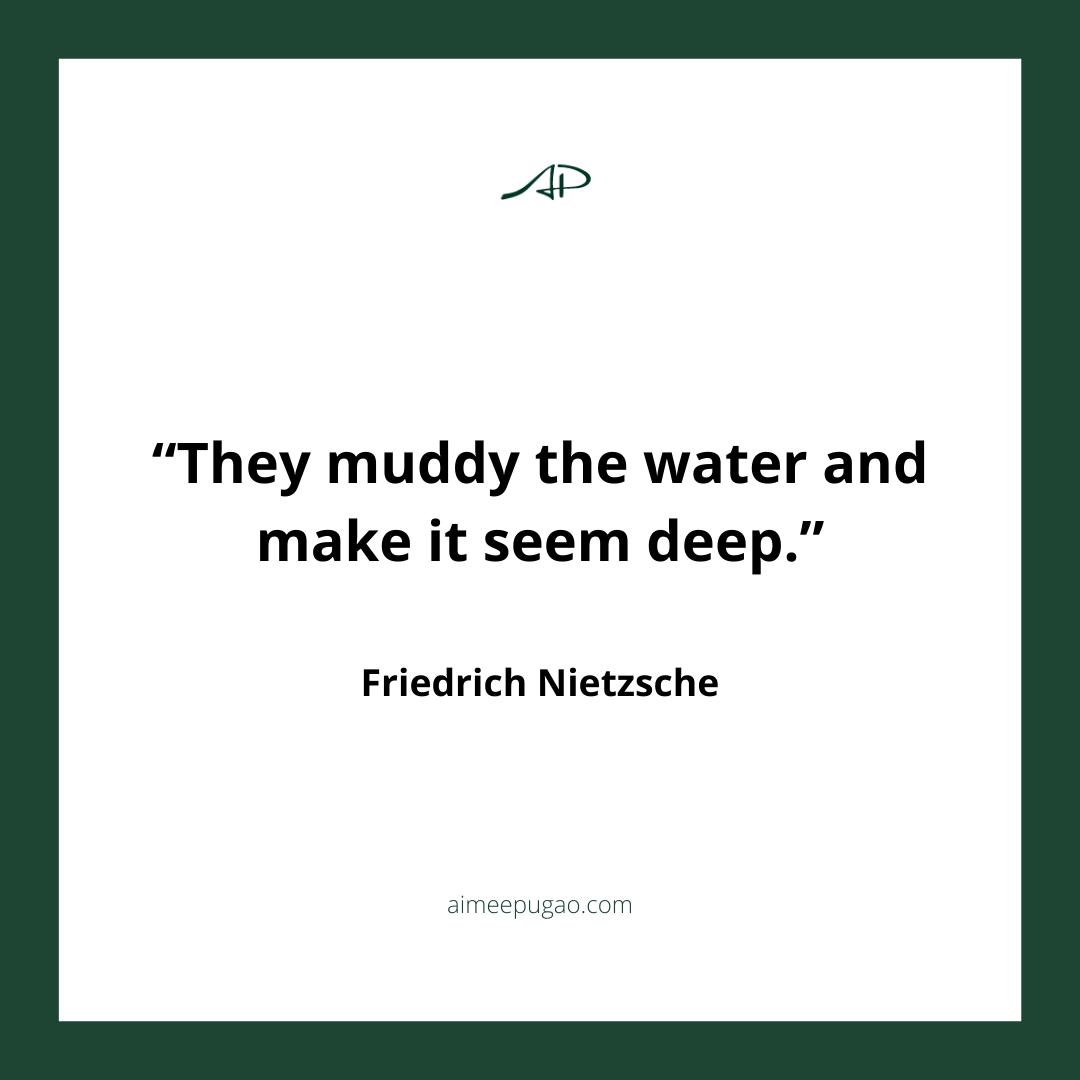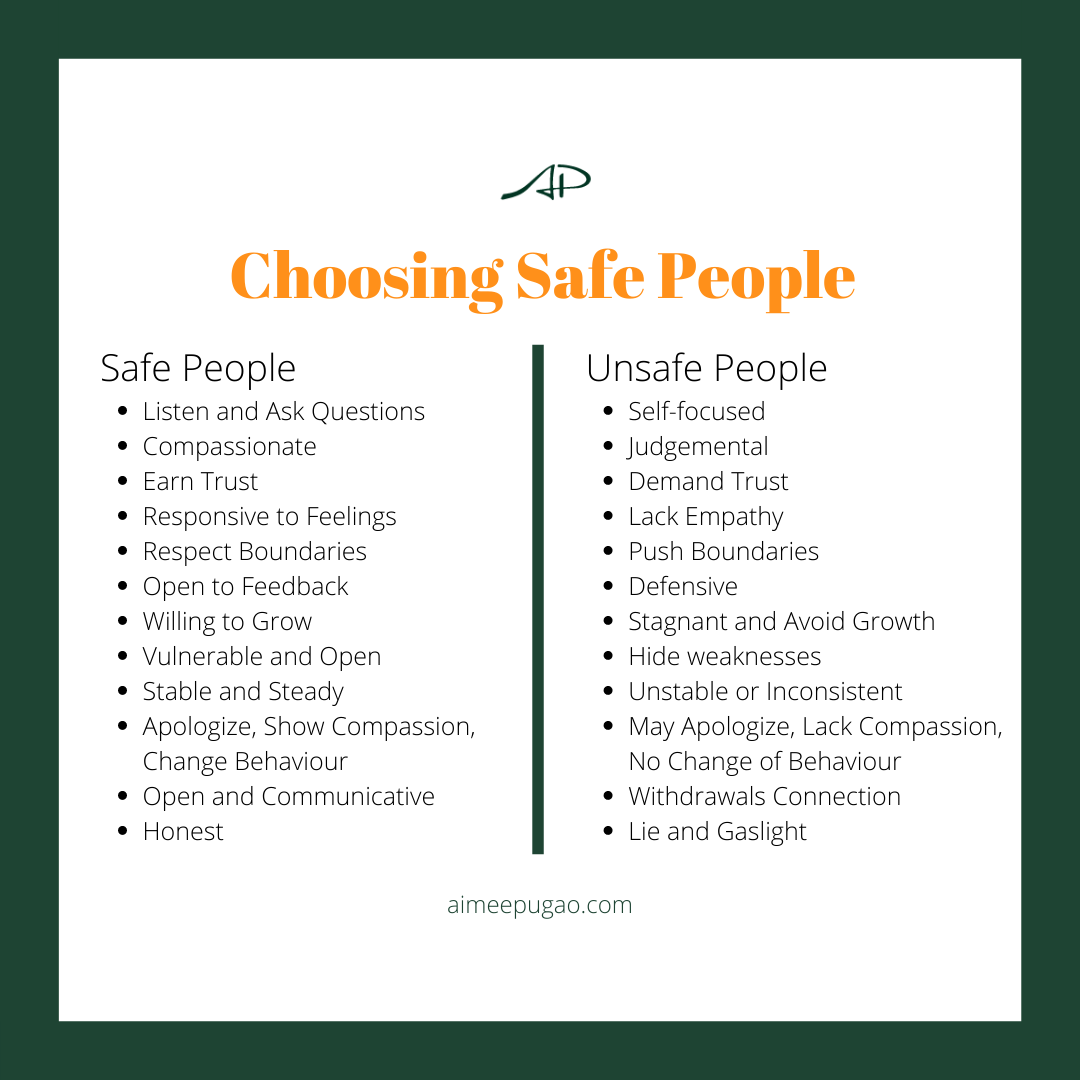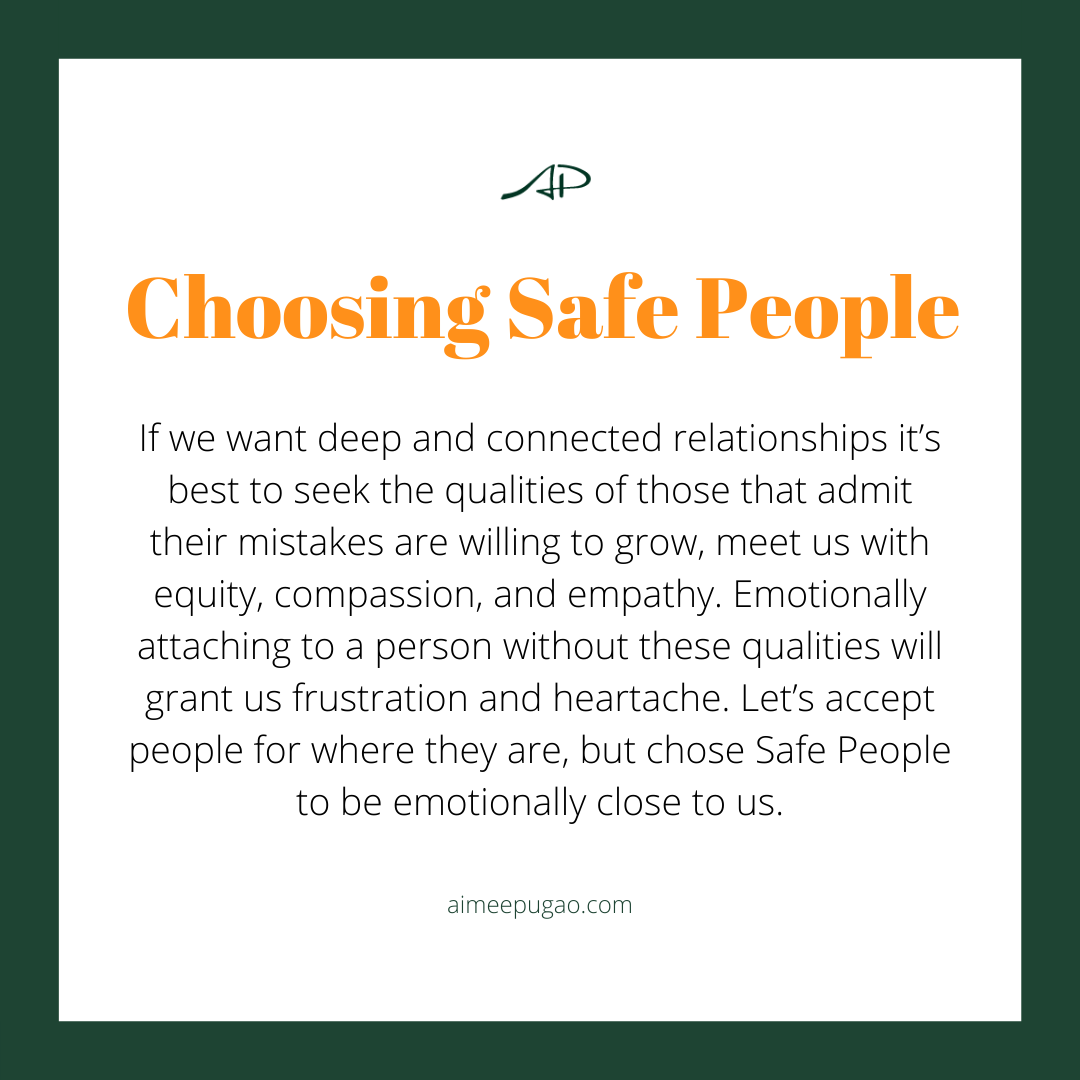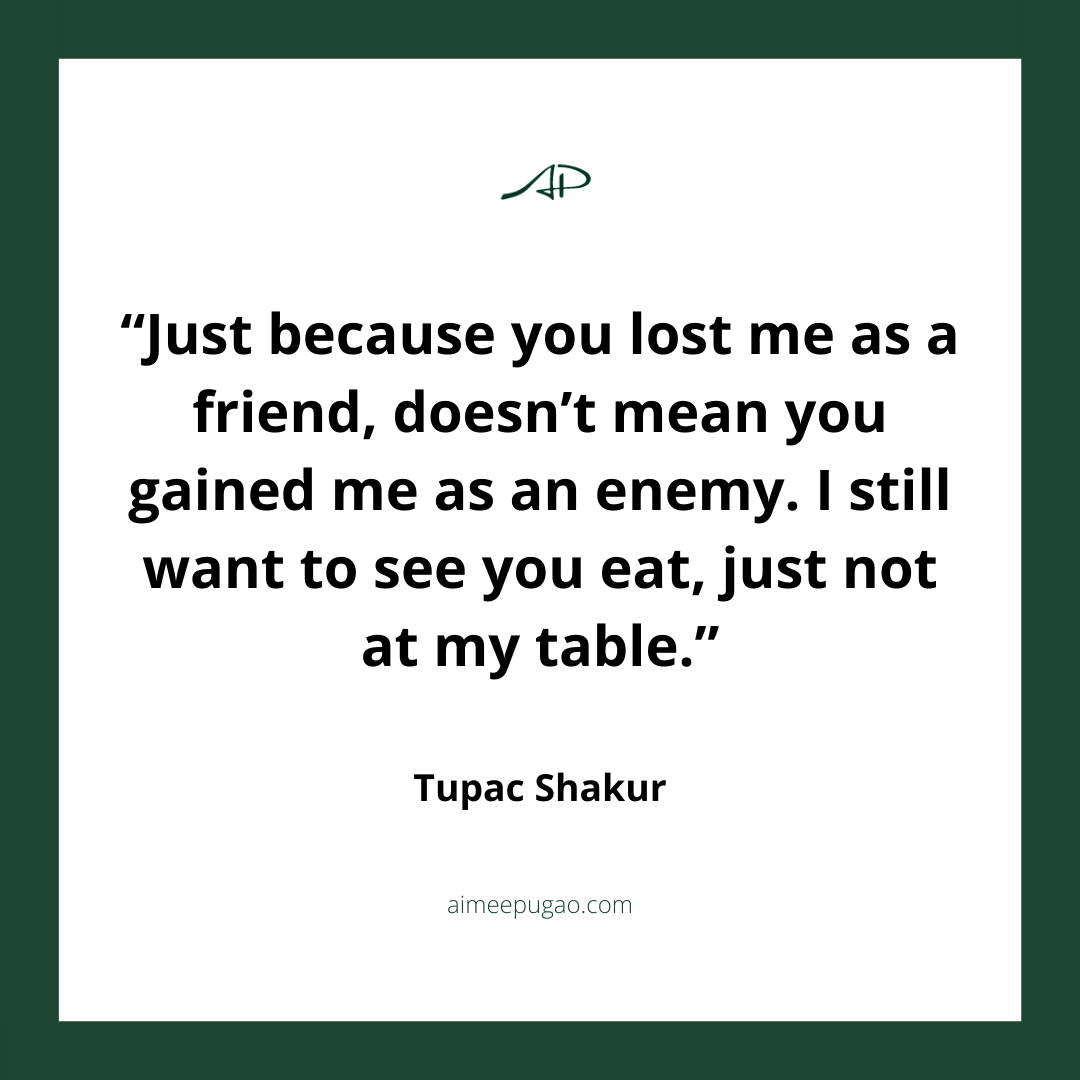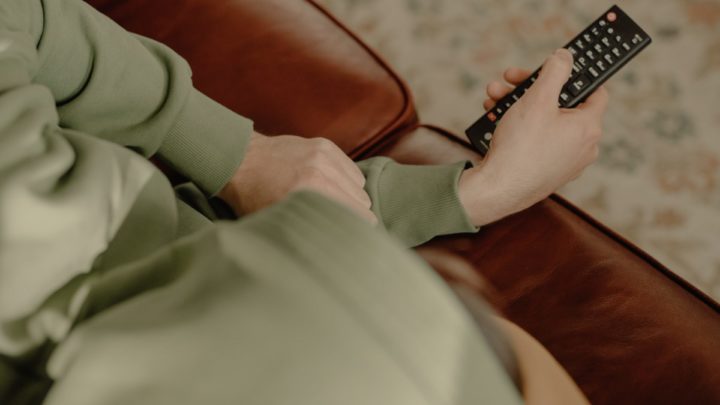What are Safe People?
Safe people are those who we generally feel emotionally safe around. We feel that they meet us with equity, acceptance, compassion, and empathy. They are willing to grow and learn from their shortcomings and mistakes. There are many pleasant people in this world, but just because people are nice, well-meaning and we have similar interests, doesn’t always make them a confidant or suitable partner.
We need to recognize the difference between a Safe person and an Unsafe one. When we recognize the differences, we can detect patterns of healthy relating and patterns of dysfunction. Recognizing the traits of Safe People and Unsafe People will keep our relationships drama-free, easy, and strongly connected.
“They muddy the water and make it seem deep.”
– Friedrich Nietzsche
This is not to say people are bad, the majority of us are trying our best, for what we know. There are many of us in this world wanting to be liked or who are struggling. When we are under a strain of groupthink, social expectations, figuring out who we are, most will pick the path of least resistance. That’s okay since it’s difficult to stand alone in our convictions, or even know who we are, especially the values of our collective society are in opposition to self-actualization.
If we have someone in our life who qualifies for most of the Unsafe traits listed below consistently, it may be a good idea to reconsider how we interact in that relationship.
This list is also helpful for those of us to wish to become a Safer person, for ourselves and those close to us.
| # | Safe People | Unsafe People |
| 1. | Listen and Ask Questions. Ask questions and are curious about us. They will get to know who we are. There will be an exchange of conversation. They’ll listen, share, and are honest with us. | Self-Focused. They tend to focus on themselves, making most conversations about their issues and their life. When we attempt to share about us, comments veer back to them. |
| 2. | Compassionate. We all have obstacles in our lives from time to time, and we have done things which we are not proud of. Safe people will offer us compassion rather than condemn us for our wrongdoings. | Judgemental and Dismissive. They will judge us and criticize us. We feel we can’t be open or admit our vulnerability as they will attempt to fix us and dismiss our emotions. They might say things like, “You’re talking about this again?”, “You are too emotional.” |
| 3. | Earn Trust. They understand that trust can only be built over time. It grows when we experience repeated and consistent and considerate behaviour. | Demand Trust. Often believe that trust should be given right away and they act hurt or defensive if not. |
| 4. | Responsive to Feelings. Typically listen, hear what we have to say, and will make an effort to understand our position. They are responsive to our emotions and validate feelings, experiences and pain. It may not be immediate, since no one is perfect. We generally feel seen, heard, and understood. | Lack of Empathy. Inability to take in other people’s emotions and feelings and consequently cannot provide support. On the extreme end they interrupt, act intolerant of our feelings, ignore, and unwilling to compromise. They tend to give the silent treatment, refuse to answer questions or give evasive replies. |
| 5. | Respect Boundaries. They recognize and respect our limits. They may inquire, but out of curiosity and getting to know us, rather than in a condemning sense. They understand that respecting our boundaries is an essential part of nurturing relationships. | Push Boundaries. Unsafe people will push our boundaries and respond negatively to us saying no. They have little to no consideration for our uncomfortableness. On the extreme end, they resort to coercion or manipulation in the form of guilt trips or overt disapproval. |
| 6. | Open to feedback and concern. Safe people are open to feedback, expressions of concern and even criticism. They’ll look for win-win, compromise, and be willing to admit their wrongs. They may not always agree, but will have developed reasons for their boundaries and will explain when confronted. | Defensive. Unsafe people if confronted with our concerns and get upset or angry, project, blame, justify, or defend. Prone to act distant, ignore, and unwilling to listen or compromise. We’ll notice with defensive people, we’ll get caught in circular conversations and arguments with no resolutions. |
| 7. | Willing to Grow. Everyone makes mistakes. We all have aspects of behaviour that inhibit our well-being. Safe people will learn from mistakes and will grow over time. They’re likely to set goals, challenging themselves to become a better version of themselves. | Stagnant and Avoid Growth. Unsafe people avoid facing their issues. Tend to blame others, respond defensively, and fail to see their contributions. They don’t change and tend to stay at the same emotional level throughout life. |
| 8. | Vulnerable and Open. Safe people take the emotional risk to be open and vulnerable. They’ll view it as necessary to connect with themselves and others. Amid stressful times, they’ll ask for help when they need it. | Hide Weakness. They act like they have it all together, instead of admitting their weaknesses, shortcomings, mistakes, or flaws. They view vulnerability as a weakness and flaw in character. In stressful times, they won’t ask for help. |
| 9. | Stable and Steady. We all have a season or two of instability. Safe people will bounce back from that season. Generally, reliable, emotionally stable, their words match their actions. | Unstable or Inconsistent. They can seem stable initially, however over time, our trust in their character dwindles. They can be unsupportive, jealous, unreliable, or inconsistent. We might feel like we are on the back-burner. |
| 10. | Apologize, show Compassion and Change Behaviour. Safe people will apologize with sincerity and empathy. They will show compassion and focus on how we feel and what it will take to repair. It is followed by modifications in behaviour. Safe People truly want to better themselves and nurture their relationships. | May Apologize, Lack of Compassion, no Change of Behavior. If an apology occurs, acknowledgement seems rushed, forced or empty. May show regret for hurtful behaviour, but not compassion. They focus on how bad they feel, not how it made us feel. Behaviour stays the same. Unsafe people want to appear good rather than better themselves. |
| 11. | Open and Communicative. Safe People are open to discussion in the face of disagreement. They may need a moment apart for processing. But are open to attempting to sort it out. Safe people look for win-win, they are open to communication where both parties are seen, heard, and understood. | Withdrawals Connection. Unsafe people will withdraw connection in the face of disagreement and leave conversation unfinished. They’ll avoid and won’t answer messages. This makes the connection contingent on an agreement. If it is a romantic partner they’ll withdraw affection as well. |
| 12. | Honest. Everyone fibs or exaggerates from time to time, but Safe people admit their deceitful side and actively work at being more honest. | Lie and Gaslight. Unsafe people see deception as an effective way of dealing with problems. They will deny their deceitfulness and make us question our interpretation and reality. |
Keep in mind people are dynamic, we all grow and change, some for the better and others for the worse. If someone was safe a few years ago that doesn’t make them safe today, and vice versa. Trust is continually demonstrated and earned. If we begin noticing patterns of dysfunctional, Unsafe behaviour in someone currently close to us, we need not make excuses for them or blame ourselves, but to recognize and to emotionally distance ourselves. It could be temporarily or permanently.
If you are trying to get affirmation and love from Unsafe people, we are continuously causing ourselves grief and pain, and that’s masochistic. We need to look elsewhere for support and healthy relating.
Can We Be Close to Unsafe People?
We can still keep people somewhat close to us that aren’t exactly safe, however, it would be painful to rely on them emotionally. We have many types of relationships with Unsafe people and can trust and depend on them in different ways, but emotionally should not be one of them. They can be our work-out buddy, our going out companion, even some of our long-term friends, acquaintances, parents, siblings, and coworkers. It’s best to accept them for who they are and understand their limitations. Making Unsafe people our close confidants, people we lean on in times of stress and trouble, or partners would make our lives difficult, knowing their current limitations.
Knowing Why Does Not Excuse Behaviour
I ask “why” a lot and usually figure out reasons “why” people behave in the manner that they do. However, just because we know the origin of someone else’s behaviour doesn’t mean we should keep them emotionally close to us or continue to provide them with chances to disappoint us. They are not capable of emotionally relating to us healthily. Their pain does not excuse their actions, how they treat people, or their reluctance to grow. All it does is provide us with compassion towards their struggle, and we can provide them with compassion, forgiveness, and empathy from an emotional distance.
“Just because you lost me as a friend, doesn’t mean you gained me as an enemy. I still want to see you eat, just not at my table.”
-Tupac Shakur
If we want deep and connected relationships it’s best to seek the qualities of Safe people listed above. Those that admit their mistakes are willing to grow, and meet us with equity, compassion, and empathy. Trying to make an Unsafe person into a Safe one will grant us frustration and heartache. Let’s accept people for where they are, but chose Safe people to be emotionally close to us.
